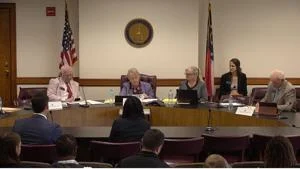(The Center Square) – Georgia was the envy of other states in 1993 when the late Gov. Zell Miller spearheaded the HOPE scholarship using funds from the newly minted lottery.
More than 2 million Georgia students with grade point averages above 3.0 have been awarded the scholarships since its inception, but Georgia residents still have the second-highest student loan debt in the country, according to a policy analyst with the Office of Policy and Legislative Analysis.
Georgians owe $69.3 billion in student loans, and the average balance is more than $42,000, according to Nathan Corbitt, who cited data from the New York Federal Reserve in his presentation to the Senate Study Committee on Higher Education Affordability. The data also shows the Peach State has one of the highest borrower delinquency rates at 1.6%.
Dr. M.J. Kim with the Southern Regional Education Board said Georgia student loan borrowing decreased from the 2015-16 academic year to the 2020-21 academic year. The organization is a nonpartisan, nonprofit interstate compact focused on education issues in 16 states.
“That’s a promising sign suggesting real progression in improving college affordability to attend four-year institutions,” Kim said. “However the average student loan for a four-year degree still exceeds $20,000.”
While borrowing has increased, tuition rates have held steady at the state’s public colleges. The Board of Regents of the University of Georgia announced in April that tuition rates would be unchanged for Georgia residents. The board increased fees for out-of-state students by 2% and for out-of-country students by 3%. It’s the seventh time in 10 years that the board has kept tuition rates flat, according to a release.
Georgia students have other state grant programs besides the HOPE scholarship, but only 1% of them are need-based, Corbitt said. The nationwide average is 74%, he said.
“Sometimes in Georgia we can’t clearly delineate beyond what is merit-based financial aid and what is need-based,” said Sen. Max Burns, R-Sylvania. “Sometimes they tend to blend. And I specifically think about the HOPE grant and I think if we look at national data, if we look at SREB data, it doesn’t necessarily recognize that there are certain support options out there that don’t neatly fit into the bucket that says need-based or merit-based.”
Chair Nan Orrock, D-Atlanta, said, “If you have merit in there, it’s not solely need-based.”
The committee has four more meetings. It will approve a final report to the Senate at its December meeting.




